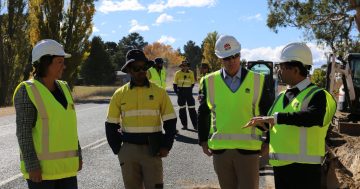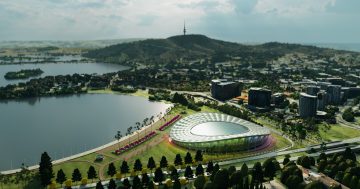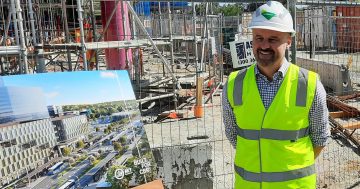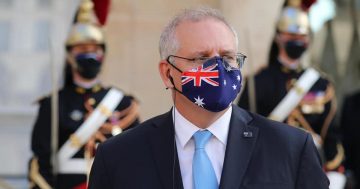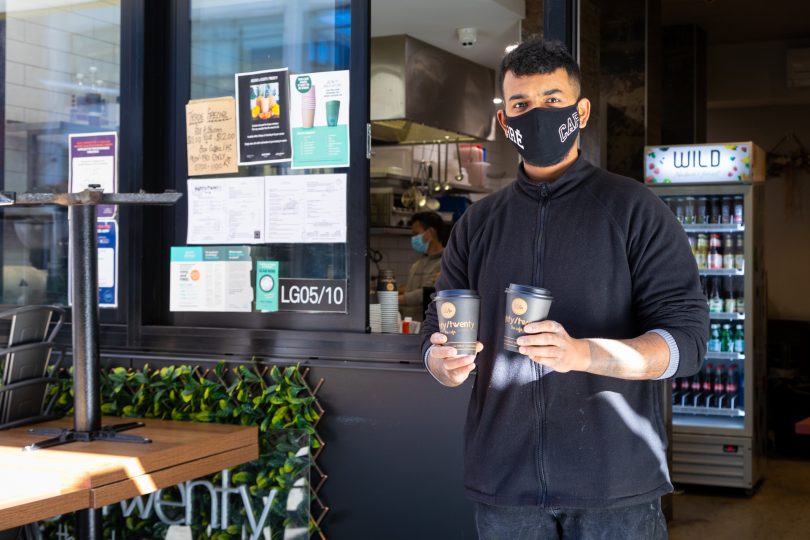
Chief Minister Andrew Barr this morning moved to quell concerns about a lack of business support when the official lockdown ends. Photo: Michelle Kroll.
UPDATED 3 pm: Chief Minister Andrew Barr has moved to quell concerns from the ACT’s business community regarding a potential lack of support for businesses that will still be unable to operate or operate fully under the proposed re-opening set out in the roadmap.
Mr Barr said that while negotiations with the Commonwealth on what future support would look like were underway, he hoped these would be resolved by the end of the day.
He has flagged that he and his government are well aware that some businesses will need ongoing support until at least the end of the year, with some businesses set to have various fees waived until the middle of next year.
Responding in particular to criticism from the Australian Hotels Association (AHA), whose ACT general manager Anthony Brierley has said the density limits would make operating a hospitality business impossible, Mr Barr said it was well understood by his government that some businesses would require ongoing support.
“It’s well understood that for some parts of the hospitality industry, one person per four square metres is not viable. That’s why economic supports will continue in that industry sector,” he said.
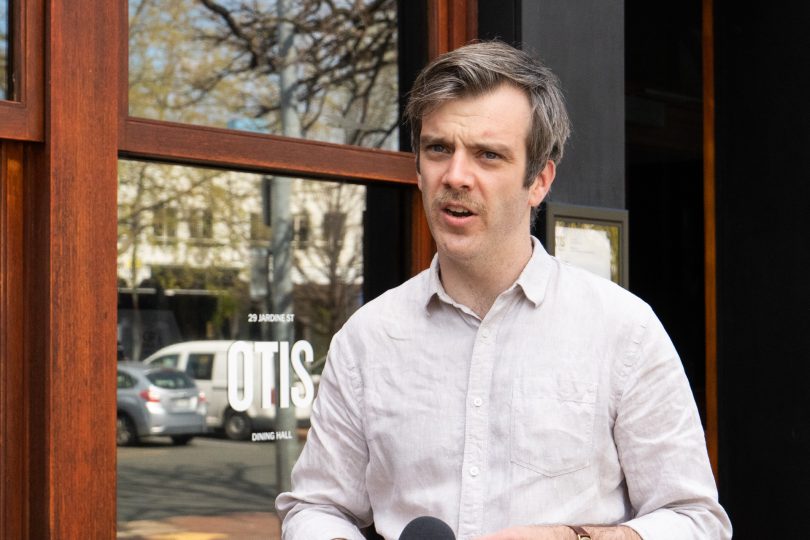
AHA ACT General Manager speaking this morning before the press conference where he said he was dismayed by yesterday’s roadmap. Photo: Dominic Giannini.
Mr Brierley said this morning, before the press conference, that he had been dismayed by yesterday’s roadmap announcement.
“Our initial response was disappointment which quickly turned to frustration and anger with the government,” he said.
Also speaking this morning before Mr Barr’s announcement, other hospitality business owners called the perceived lack of support from both the local and Commonwealth governments as a “slap in the face after slap in the face”.
There are also concerns among hospitality business owners that the al fresco model of dining does not operate as well in Canberra as it does in larger cities such as Melbourne and Sydney.
In some fiery remarks at today’s press conference, the Chief Minister said his government could not only view the roadmap through the lens of the hospitality sector as the AHA does, and that keeping higher risk venues such as nightclubs shut allowed for other sectors of the economy to reopen.
He also noted that it was not the hospitality industry’s role to set public health directions and restrictions, and nor could it control how the virus would behave and how the delta strain, in particular, would spread.
Mr Barr said the government had been faced with the choice of either leaving everything shut or allowing some activity to resume in the sector in the most COVID-safe manner possible, and they had chosen the latter.
While he would not concede that some hospitality businesses would be forced to close their doors, he did acknowledge that some will only be managing to “tread water” and that a significant part of the hospitality sector will require additional financial support.
Once again, Mr Barr criticised the Commonwealth’s program, noting the second iteration of JobKeeper would have done a better job than the current business support model.
“JobKeeper was a good program. While the first phase was a bit fast and loose, when they improved on these issues… they then refined it to a better program for the second phase.
“It just needed to be tweaked and it should have contained a mechanism to claw back [payments] from businesses who did not need that money,” Mr Barr said.
He noted the money that could have been taken back from businesses that did not need it could then have been used in another phase of the program.
The Canberra Liberals yesterday raised the issue of a discrepancy between when business owners will legally be allowed to open, and when their children could ostensibly return to school.
In a statement, Opposition Leader Elizabeth Lee said she feared that some “business owners with children also may not be able to open their businesses back up on 15 October because early learning centres and schools will not open until late October or November”.
However, Mr Barr said arrangements with schools would be relaxed to allow these children to return to school as and when their parents could return to work.
Mr Barr also anticipated that the ACT COVID-19 business support website would be updated in a timely fashion, saying the focus so far had been on actually engaging in negotiations with the Commonwealth and getting payments made.
He did say that the issue has been raised with the team responsible for updating the website.
Some business owners have also raised the issue of what density limits would be in place in an office setting. While the Chief Minister couldn’t clarify exactly what limits offices would be subject to, he said they should be “quite limited”.
“From Friday 15 October the preference [remains] that if you can work from home, you should,” Mr Barr said.
The ACT Government’s policy position for its own staff would continue to reflect this, and he encouraged the private sector to do the same.
He said a rush back to the office was not anticipated until November and December, as and when restrictions will be further scaled back.
No new close contact exposure sites have been added to the ACT Government’s exposure site list this afternoon.
New casual contact sites have been listed, all of which are on the Southside.
In Cooleman Court, ALDI is a casual exposure site on Saturday 25 September between 11:45 am and 12:50 pm and Woolworths is listed as a casual contact site on the same day between 11:55 am and 12:15 pm as well as for Friday 24 September between 11:55 am and 12:45 pm.
Coles Woden is also a casual contact site on Thursday 23 September between 12:10 pm and 1 pm.
The last casual site is Freechoice Tobacconist Erindale on Saturday 25 September between 3:30 pm and 5:20 pm.
New monitor for symptoms locations have been added in the suburbs of Chapman, Fyshwick, Isabella Plains, Kambah, Phillip and Weston.
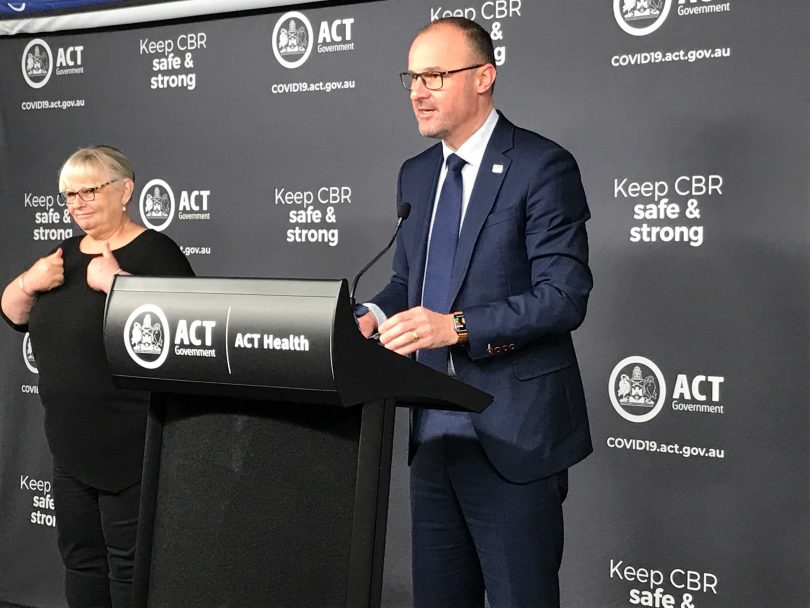
Chief Minister Andrew Barr at this morning’s COVID-19 briefing. Photo: Lottie Twyford.
UPDATED 12:30 pm: The ACT has recorded 13 new cases of COVID-19 in the past 24 hours. Of those, 11 are linked to current or identified close contacts and six are household contacts, but only one person was in quarantine for the entirety of their infectious period. At least seven spent part of their infectious period in the community.
Eight people are in hospital with COVID-19, three are in ICU and all require ventilation. Two of the intensive care patients are from NSW and Chief Minister Andrew Barr told today’s press briefing that a significant proportion of hospital patients continue to be from the region.
Mr Barr said it’s anticipated that, as restrictions ease, up to 50 per cent of intensive care patients in the Canberra Hospital could be from regional NSW.
Chief Health Officer Dr Kerryn Coleman said there were now 243 active cases and 3476 tests were carried out yesterday.
She said, as restrictions ease, it would remain critical to limit the spread of the virus through exposure locations and testing. Analysis is showing that up to 13 per cent of people are now waiting for several days before coming forward with symptoms.
“This is really concerning. Please don’t go through the drive-thru, please don’t go to the supermarket. Put a mask on and go home until you get your result,” she said.
Health Minister Rachel Stephen-Smith said a range of scenarios for ACT health services were being planned using modelling on hospital admissions, although the Delta strain’s high transmissibility, and high vaccination rates, made entirely accurate predictions difficult.
Currently around five per cent of cases require admission to hospital about five to seven days after contracting the virus. It’s anticipated this rate will decrease with higher vaccination rates.
There have been 132 cases in the surrounding region. Modelling includes the NSW demand on ACT hospital beds and COVID wards are being set up in Goulburn and Bega.
Mr Barr said the pathway out of lockdown would be a gradual balancing act that all jurisdictions will face. NSW and Victoria are likely to allow travel earlier than other states and territories that are COVID-free.
“As we remain an identified COVID hotspot by the Commonwealth and all State governments, there are strict requirements if you travel outside the ACT. Once you cross the border, you must adhere to the rules of the jurisdiction you are travelling to,” Mr Barr said.
Border community arrangements will continue beyond October 1 and Mr Barr said he was optimistic that the ACT, NSW and Victoria would have common travel arrangements beyond lockdown, but it was likely that ACT residents would be locked out of other COVID-free jurisdictions for sometime longer.
The ACT Government continues to work on business support packages directly with Commonwealth Treasurer Josh Frydenburg. Mr Barr said this support recognised that some industry sectors would require ongoing financial support beyond the time lockdown ends on October 15, including hospitality, accommodation, arts, events and tourism.
These include the COVID-19 small business hardship scheme, commercial tenancy support, the accommodation and tourism venues scheme, small tourism recovery payments, hospitality licence and fee waivers including the food business registration waiver which has been extended until March 2022.
Outdoor dining permit fees have been waived until June 30, 2022. Annual licence fee waivers are in place for some liquor licences, tapered to a further 50 per cent reduction from April this year until March 2022. This includes nightclubs, cafes, bar licenses, catering, club and special licences.
Payroll tax waivers and deferrals are in place for the 10 per cent of businesses who are not already exempt from payroll tax.
Individual lost hours of work disaster payments will continue until at least October 15. Mr Barr said he had asked the Commonwealth for an urgent update on the future of this payment during the transition out of lockdown in each jurisdiction.
Mr Barr said the payments were welcome, but clarification was required as it was clear some people would continue to have restricted hours of work when lockdown ends.
11:50 am: The ACT has recorded 13 new cases of COVID-19 in the past 24 hours.
Of the new cases, 11 are linked to current or identified close contacts and two are under early investigation.
Only one person was in quarantine for the entirety of their infectious period; at least seven spent part of their infectious period in the community.
Eight people are in hospital with COVID-19, three are in ICU and all require ventilation.
Yesterday, 3476 tests were conducted.
NSW recorded 863 cases and seven deaths. Of those eligible in NSW, 85.7 per cent have now had one dose of the COVID-19 vaccine and 60.4 per cent are double-dosed.
Yesterday NSW had 787 new cases and 12 deaths.
In Victoria, 867 cases were recorded and four deaths.
Yesterday there were 705 new cases and one death.
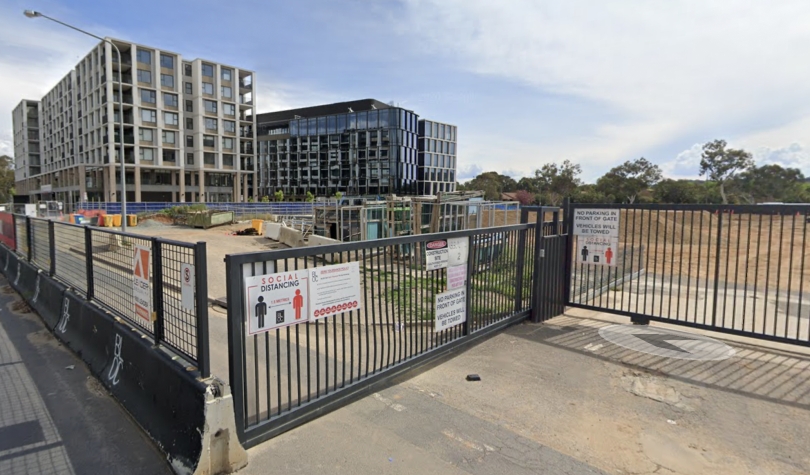
The DKSN construction site at 21-23 Challis Street has been listed as a close contact site. Photo: Google Maps.
9:20 am: Several construction sites have overnight been named as close contact sites as foreshadowed by the ACT’s Chief Health Officer yesterday.
The CORE Building Group – Mulberry construction site at 330 Northbourne Avenue is a close contact exposure site on Thursday, 23 September and Friday, 24 September between 6 am and 4 pm on both days.
DKSN construction site at 21-23 Challis Street is also listed as a close contact site on Wednesday, 22 September between 6:50 am and 4 pm and Thursday 23 September to Friday, 24 September between 6 am and 4 pm.
Six new sites have been listed as casual exposure locations.
In the south, these are Woolworths Kambah on Sunday, 26 September between 10:20 am and 11:10 am and Next Practice Deakin on Tuesday, 21 September between 1:45 pm and 2:50 pm.
In the city, Grease Monkey is listed as a casual contact site on Friday, 24 September between 9 am and 3:30 pm while in Gungahlin, there are three new locations of concern.
The Gungahlin Medical and Surgical Centre on Thursday, 23 September between 4:10 pm and 5 pm, Woolworths Gungahlin also on Thursday, 23 September between 8:50 pm and 9:45 pm and Vina Groceries on Wednesday, 22 September between 5:45 pm and 6:50 pm have all been listed as casual contact exposure locations.
Several new “monitor for symptoms” locations have also been added to the ACT Government’s exposure site list.
These are mostly supermarkets, chemists and other essential retail and are in the suburbs of Belconnen, Charnwood, Chisholm, Franklin, Fyshwick, Greenway, Griffith, Gungahlin, Phillip and Weston.
See the full list for specific exposure dates and times.
The ACT Government yesterday announced its pathway out of lockdown on the same day the Chief Minister reported the first death of this current outbreak.
The ACT’s plan for the next few weeks is noticeably different from that of neighbouring NSW in which unvaccinated people will not be able to partake in the same freedoms afforded to those who are fully vaccinated.
Chief Minister Andrew Barr has repeatedly refused to go down this path, noting that not only would enforcement and policing be difficult, there is little vaccine hesitancy in the ACT, but rather a lack of supply.
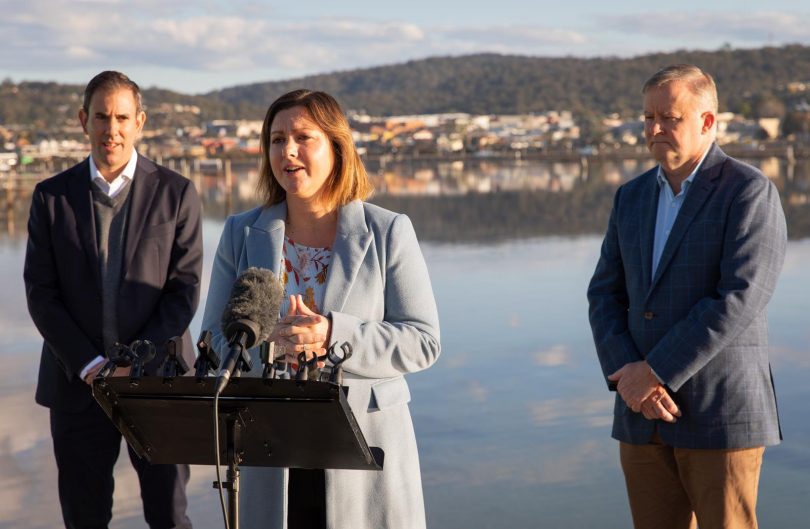
Kristy McBain (centre) this morning signalled several issues with the 11 October changes in the restrictions which would allow vaccinated people more freedom. Photo: Kristy McBain Facebook.
Speaking this morning on breakfast radio, Member for Eden-Monaro Kristy McBain said there were some issues with this approach. She cited supply issues in the region, the length of time between first and second doses of Astra-Zeneca and the relatively short amount of time during which young people have been eligible for vaccination.
She also noted this approach would put significant pressure on small businesses to police visitors and patrons.
From 11 October, a number of restrictions will ease in NSW for the vaccinated. This includes the re-opening of some businesses and relaxation of the rules around regional travel.
However, Ms McBain noted there is still some clarification required around what will happen in the border region.
Minister for Health Rachel Stephen-Smith this morning told ABC Radio that anyone who lives in any of the approved postcodes can travel into the ACT in order to enjoy the minimally relaxed restrictions from this weekend.
The largest change is that from Friday, 1 October at 12:01 am, two people can visit another person’s home.
According to Ms Stephen-Smith, the upcoming weeks would see an “interesting interaction” between the two jurisdictions given their differing rules. Currently, people returning from the ACT must complete a border declaration and are then subject to 14-day stay-at-home orders. Ms Stephen-Smith did not believe that this rule would change from 11 October.
She noted that 29 October would see a further relaxation of the rules, but caveated this by saying it would depend on the public health situation throughout regional NSW.
Chief Minister Andrew Barr, Health Minister Rachel Stephen-Smith and ACT Chief Health Officer Dr Kerryn Coleman will provide an update on the COVID-19 situation at 11:45 am today.
More to come.












